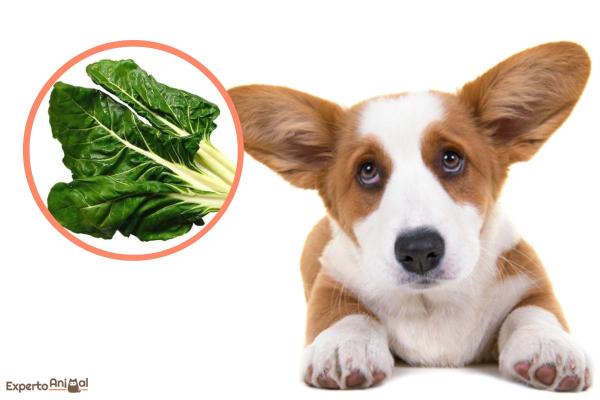
Chard is a herbaceous plant of the Chenopodiaceae family, cultivated by the Assyrians in Upper Mesopotamia since 800 BC. Throughout history, it has been credited with a variety of medicinal benefits. In addition, it is a highly recommended vegetable for people on a slimming diet, as it is very filling, nutritious and low in calories. But can chard also be integrated into the diet of your dog?
In the following AnimalWised article, we explain if dogs can eat chard and how to give it to them.
Is chard good for dogs?
Swiss chard is a vegetable with high nutritional value and low caloric content, offering numerous nutritional benefits. In addition to its high content of fiber, vitamins and minerals, it has a laxative and digestive effect. Therefore, it is often used in slimming diets, since it is very satiating and low in calories.
Dogs can also benefit from the great nutritional advantages of this vegetable. Nevertheless, there are some points to consider, which we describe below, so that their contribution does not negatively affect the health of dogs:
- Oxalic Acid: Like other leafy green vegetables such as spinach and lettuce, Swiss chard contains oxalic acid, which forms calcium oxalate when combined with calcium. This salt can pass into the urine and lead to calcium oxalate urinary stones.
- Nitrates: Nitrates do not have high toxicity per se, but after consumption are converted by the body into nitrites, which can cause a blood disorder known as methemoglobinemia.
You can prevent chard from having these negative effects on your dog's health by reading the following sections, which discuss how and in what quantity you can include this vegetable in your dog's diet without endangering his health.
Just like Swiss chard, spinach is a leafy green vegetable that is often included in dogs' diets. But just like chard, it should only be fed in moderation. Read this other article about spinach for dogs to learn more.
Benefits of chard for dogs
The high nutritional value of chard is due, among other things, to its high content of fiber, vitamins, and minerals. The main nutritional benefits of chard include the following:
- Chards are an excellent source of soluble fiber: although dogs' digestive systems cannot digest fiber, it is a fundamental nutrient in their diet. In other words, fiber adds volume to the ration, creates a feeling of satiety, helps maintain the intestinal microbiota, regulates intestinal transit and stool consistency.
- Chards have a low energy value: this makes them a suitable ingredient for animals that need an energy-reduced diet, such as overweight dogs.
- Chards provide significant amounts of vitamins: especially vitamin A, vitamin C, vitamin B9 (folates) and vitamin B3 (niacin).
- Chards are very rich in minerals: they provide very large amounts of iodine, iron, and magnesium. Not only that, but they also contain potassium and calcium, although to a lesser extent.
- Chards contain lutein: lutein is a carotene that is beneficial for maintaining visual acuity and prevents the development of cataracts.
Read this other article to know more about what other vegetables are good for dogs.

How to give chard to my dog?
First, you should wash the chard with plenty of water to remove any impurities or pesticides that may be on its surface.
Since your dog will most likely reject raw chard, we recommend that you cook it. In particular, we advise you to boil it, as this process offers an important advantage. As we mentioned in earlier sections, chard contains oxalic acid, which can have negative effects on dogs' urinary system. However, when boiled, the oxalates remain in the broth, reducing the content of this antinutrient in the vegetable.
Once the broth is cooked and drained, you can mix it into the food or homemade ration, depending on the food you normally offer your dog.
As a guideline, you can include this vegetable in your dog's diet once a week in the following way:
For small dogs: it is enough to add 1-2 leaves, depending on the size of the leaf.
For large dogs: it is enough to add 3-4 leaves.
In any case, we recommend you consult your trusted veterinarian before adding a new food to your dog's diet to avoid health risks.

Contraindications of chard for dogs
Although Swiss chard is a vegetable suitable for dogs, there are certain situations in which its consumption may be contraindicated. In particular, the consumption of this vegetable should be avoided in the following cases:
- Dogs with allergies or food intolerances.
- Dogs with digestive problems or with a digestive system that is particularly sensitive to changes in diet.
- Dogs with kidney problems, especially if they have urinary stones or have a tendency to form urinary stones.
- Male dogs of small breeds, such as Miniature Schnauzers, Chihuahuas or Yorkshire Terriers, as they are more prone to forming calcium oxalate stones.
- Dogs with anemia.
There are some fruits and vegetables that you should not give to your pet under any circumstances because they can seriously affect his health. Read this other article to learn which fruits and vegetables are forbidden for dogs.
If you want to read similar articles to Can Dogs Eat Swiss Chard?, we recommend you visit our Homemade diets category.
- Spanish Agency for Food Safety and Nutrition (AESAN). Consumption recommendations for children due to the presence of nitrates in leafy vegetables .
- Basque Foundation for Food Safety (ELIKA). (2013). Undesirable substances in animal feed: nitrites
- Ministry of Agriculture, Fisheries and Food. Chard; Beta vulgaris var. Cycla. Available at: https://formacion.intef.es/pluginfile.php/176598/mod_imscp/content/13/34-acelga.pdf